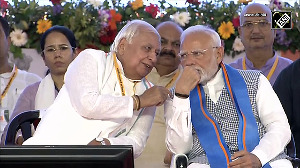China's first Mars probe will be launched between November 8 and 20, after two years delay, a top scientist said. Yinghuo-1, a micro-satellite weighing 110 kilogramme, will be sent into space with Russia's Phobos-Grunt mission at the Baikonur Cosmodrome launch site in Kazakhstan, state-run China Daily reported.
The probe is expected to enter a preset orbit around Mars between Aug-Sept next year, Wu Ji, director of the National Space Science Centre under the Chinese Academy of Sciences said. Experts said the project is expected to lead China further into deep space exploration, following two successful lunar probe projects since 2007.
Wu, who has designed scientific goals for the project with his colleagues, said Yinghuo-1 has been safely transported to the launch site, and a check showed everything is fine.
Last month China successfully launched its maiden space lab Tiangong-1, meaning Heavenly Palace, which is a test-bed for a larger 60-tonne space station to be put in place by 2020.
Also, China geared up to launch its third moon mission to land a rover on the moon surface after its recent successful mission Chang'e-2, which after reaching close lunar orbit has drifted deep into space.
Besides successful lunar missions China embarked on an ambitious space programme, which included creating a new satellite system to rival GPS. It also demonstrated its ability to shoot down satellites by knocking out one of its own satellite, few years ago.
Analysts say that China is stepping its space programme to catch up with US after Obama administration had imposed steep budget cuts for National Aeronautics and Space Administration programmes. The mini-Mars satellite's goals include exploring Mars' space environment and rely back the first images of Mars taken by a Chinese satellite.
"Human beings now have only limited knowledge of Mars' upper atmosphere," Wu said.
On board the probe are a magnetometer to explore Mars' magnetic field, a device to explore its atmosphere and two cameras to take photos of the Red Planet for studying dust storms and their impact on the upper atmosphere, he said.
Russia's Phobos-Grunt mission will land on the Martian moon Phobos, collect geological samples and return them to Earth in three years. The mission was set for October 2009, but later postponed to this year to enhance the reliability of the project.
WAJ Russian space officials explained in 2009 that scientists needed more time to study Phobos' surface and design better facilities to collect soil samples from Phobos.
Earlier reports said Yinghuo-1 will travel 350 million km in 11 months before separating from the Russian landing craft to enter the planet's orbit. It is expected to circle around the planet for one year.
Pang Zhihao, deputy editor-in-chief of the monthly Space International, said that it is difficult to manoeuvre the satellite into orbit. "If the timing of the manoeuvres are not right, or the probe's speed is too fast or too slow, the satellite could possibly fail to be captured by the planet and miss the orbit," he said, adding that manoeuvring a Mars probe that far is extremely demanding.
Only European Space Agency has succeeded in sending a probe into orbit around Mars in one shot. Mars probe projects by the United States and Japan have all encountered failures, he said. Without a deep space network to monitor and control interplanetary spacecraft, China relies on Russian facilities to its first Mars probe project, he said.
China is expected to complete a deep space network by 2016, including two domestic monitors and tracking stations and a third in South America, Qian Weiping, a Chinese scientist in the field said earlier.
"With the network ready and a powerful launch vehicle, China will conduct its next Mars exploration in the future on our own," said Wu Ji, adding the academy has started to research scientific goals and devices on board for the future Mars explorations.
Topics of interest to scientists across the world include whether there was once life on Mars and how its atmosphere took shape.











